Analyzing Act-Utilitarianism in Research and Ethics Context
VerifiedAdded on 2022/08/09
|5
|1156
|473
Essay
AI Summary
This essay delves into the ethical considerations of computer simulations and their implications for research, focusing on the philosophical framework of act-utilitarianism. The student essay begins by introducing the core tenets of act-utilitarianism, as articulated by John Stuart Mill, and then examines Preston Greene's argument against experimenting with simulations. The essay explores whether an act-utilitarian would agree with Greene's position, considering the potential consequences of such experiments, including the possibility of human annihilation within a simulated reality. By analyzing the principles of moral obligation and the pursuit of happiness, the essay argues that act-utilitarianism supports Greene's stance, emphasizing the importance of avoiding actions that could lead to negative outcomes, even in the pursuit of knowledge or understanding. The essay concludes by reinforcing the significance of prioritizing actions that promote happiness and avoid potential harm, especially within the context of advanced technological possibilities.
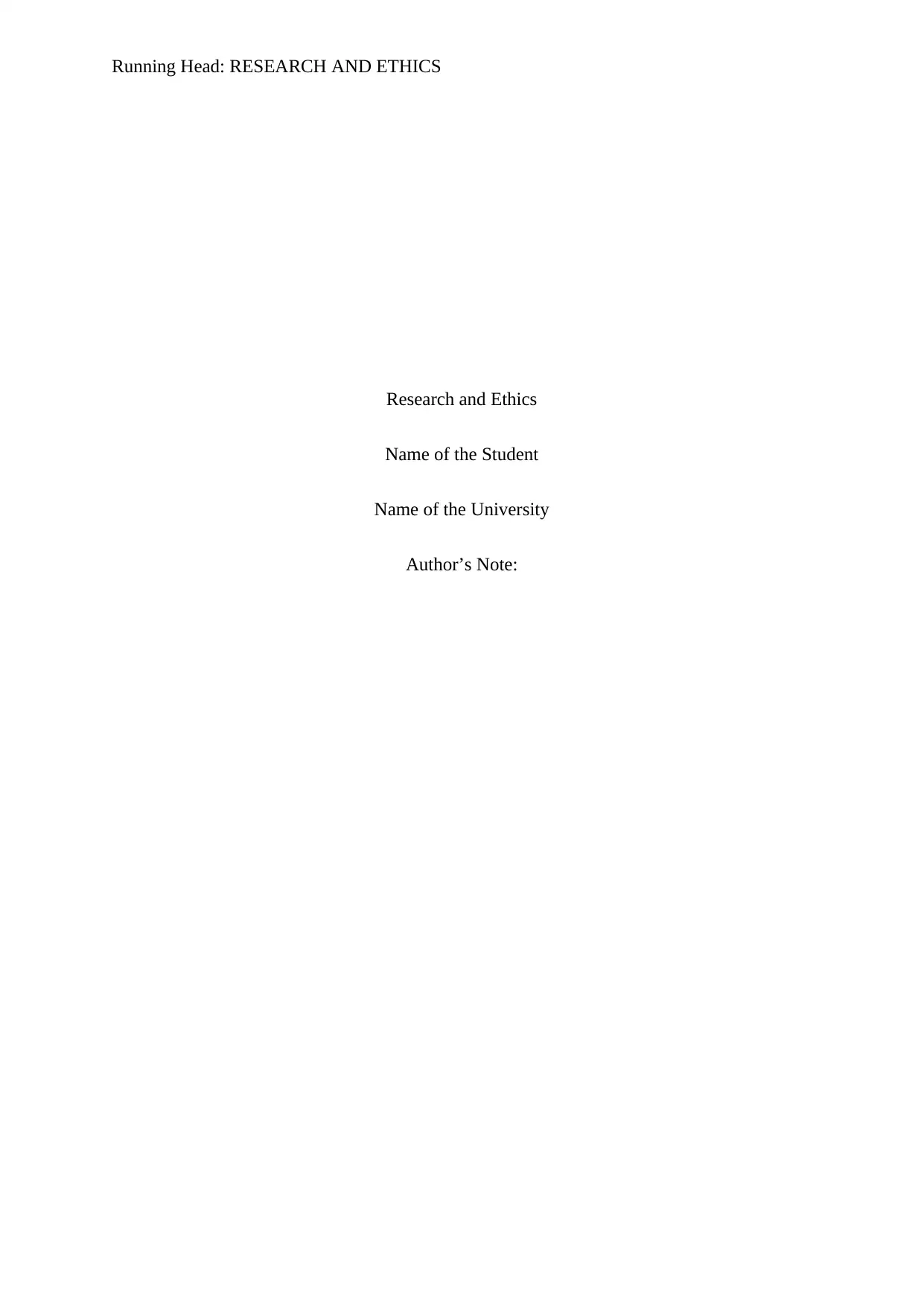
Running Head: RESEARCH AND ETHICS
Research and Ethics
Name of the Student
Name of the University
Author’s Note:
Research and Ethics
Name of the Student
Name of the University
Author’s Note:
Paraphrase This Document
Need a fresh take? Get an instant paraphrase of this document with our AI Paraphraser
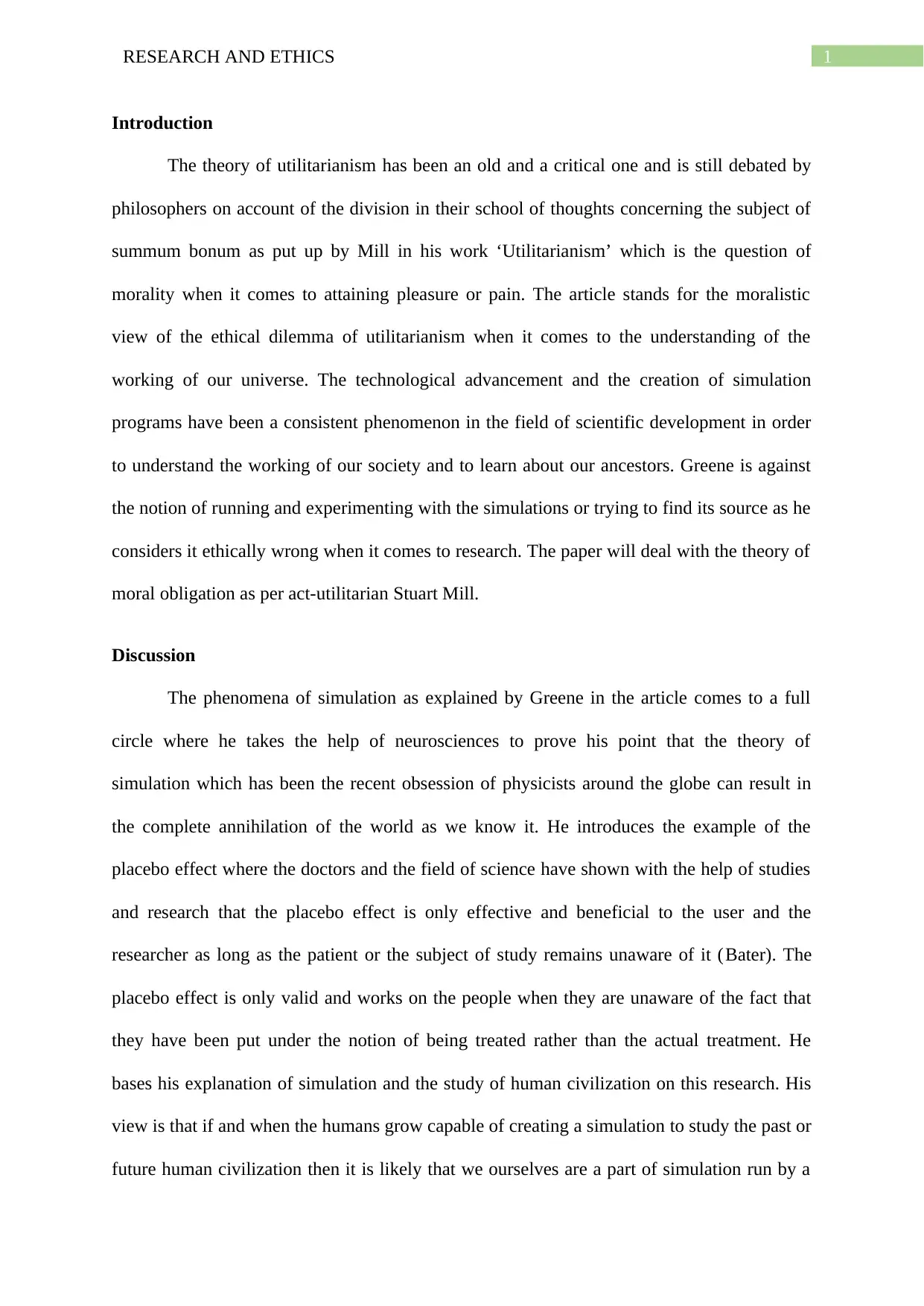
1RESEARCH AND ETHICS
Introduction
The theory of utilitarianism has been an old and a critical one and is still debated by
philosophers on account of the division in their school of thoughts concerning the subject of
summum bonum as put up by Mill in his work ‘Utilitarianism’ which is the question of
morality when it comes to attaining pleasure or pain. The article stands for the moralistic
view of the ethical dilemma of utilitarianism when it comes to the understanding of the
working of our universe. The technological advancement and the creation of simulation
programs have been a consistent phenomenon in the field of scientific development in order
to understand the working of our society and to learn about our ancestors. Greene is against
the notion of running and experimenting with the simulations or trying to find its source as he
considers it ethically wrong when it comes to research. The paper will deal with the theory of
moral obligation as per act-utilitarian Stuart Mill.
Discussion
The phenomena of simulation as explained by Greene in the article comes to a full
circle where he takes the help of neurosciences to prove his point that the theory of
simulation which has been the recent obsession of physicists around the globe can result in
the complete annihilation of the world as we know it. He introduces the example of the
placebo effect where the doctors and the field of science have shown with the help of studies
and research that the placebo effect is only effective and beneficial to the user and the
researcher as long as the patient or the subject of study remains unaware of it (Bater). The
placebo effect is only valid and works on the people when they are unaware of the fact that
they have been put under the notion of being treated rather than the actual treatment. He
bases his explanation of simulation and the study of human civilization on this research. His
view is that if and when the humans grow capable of creating a simulation to study the past or
future human civilization then it is likely that we ourselves are a part of simulation run by a
Introduction
The theory of utilitarianism has been an old and a critical one and is still debated by
philosophers on account of the division in their school of thoughts concerning the subject of
summum bonum as put up by Mill in his work ‘Utilitarianism’ which is the question of
morality when it comes to attaining pleasure or pain. The article stands for the moralistic
view of the ethical dilemma of utilitarianism when it comes to the understanding of the
working of our universe. The technological advancement and the creation of simulation
programs have been a consistent phenomenon in the field of scientific development in order
to understand the working of our society and to learn about our ancestors. Greene is against
the notion of running and experimenting with the simulations or trying to find its source as he
considers it ethically wrong when it comes to research. The paper will deal with the theory of
moral obligation as per act-utilitarian Stuart Mill.
Discussion
The phenomena of simulation as explained by Greene in the article comes to a full
circle where he takes the help of neurosciences to prove his point that the theory of
simulation which has been the recent obsession of physicists around the globe can result in
the complete annihilation of the world as we know it. He introduces the example of the
placebo effect where the doctors and the field of science have shown with the help of studies
and research that the placebo effect is only effective and beneficial to the user and the
researcher as long as the patient or the subject of study remains unaware of it (Bater). The
placebo effect is only valid and works on the people when they are unaware of the fact that
they have been put under the notion of being treated rather than the actual treatment. He
bases his explanation of simulation and the study of human civilization on this research. His
view is that if and when the humans grow capable of creating a simulation to study the past or
future human civilization then it is likely that we ourselves are a part of simulation run by a
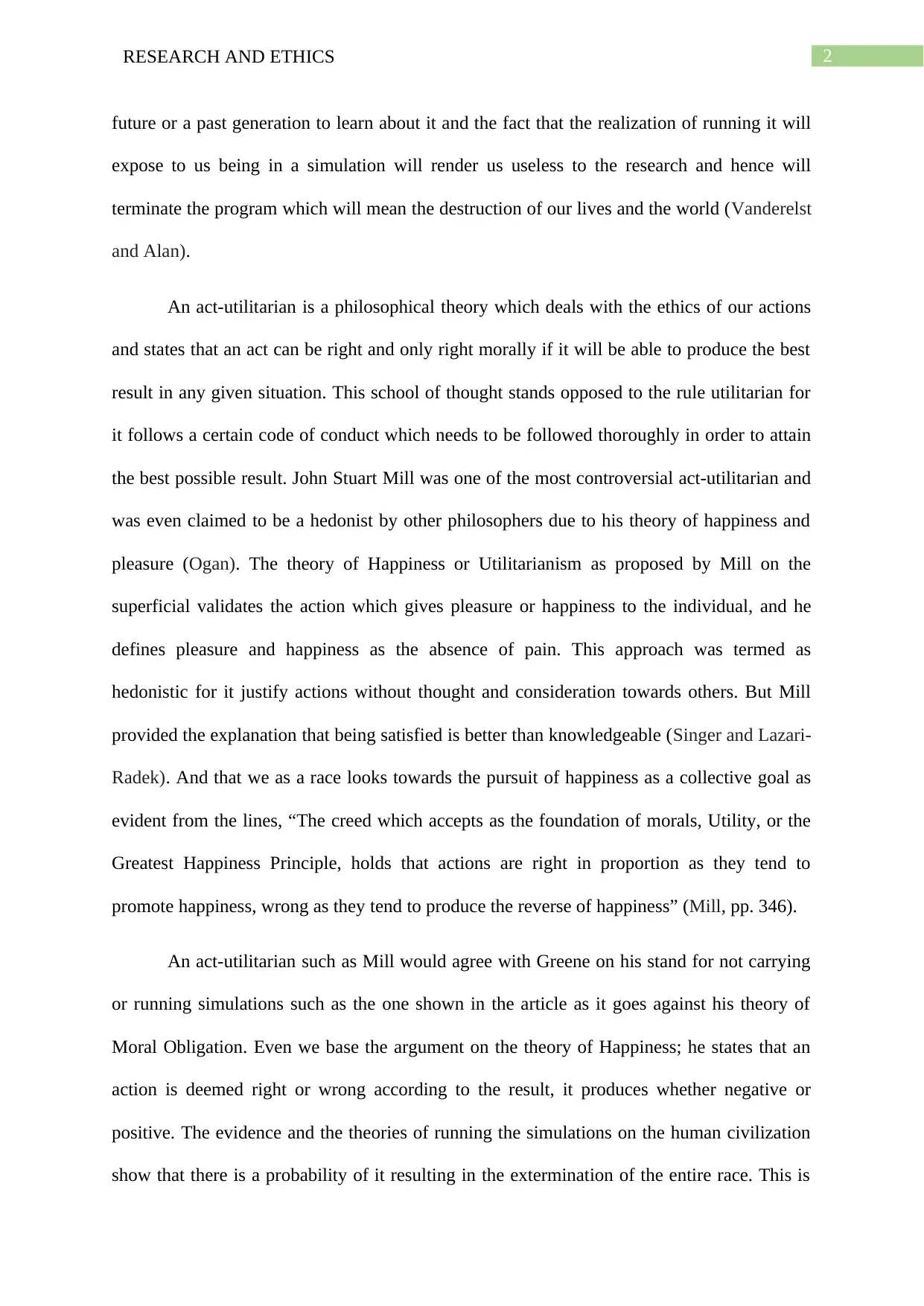
2RESEARCH AND ETHICS
future or a past generation to learn about it and the fact that the realization of running it will
expose to us being in a simulation will render us useless to the research and hence will
terminate the program which will mean the destruction of our lives and the world (Vanderelst
and Alan).
An act-utilitarian is a philosophical theory which deals with the ethics of our actions
and states that an act can be right and only right morally if it will be able to produce the best
result in any given situation. This school of thought stands opposed to the rule utilitarian for
it follows a certain code of conduct which needs to be followed thoroughly in order to attain
the best possible result. John Stuart Mill was one of the most controversial act-utilitarian and
was even claimed to be a hedonist by other philosophers due to his theory of happiness and
pleasure (Ogan). The theory of Happiness or Utilitarianism as proposed by Mill on the
superficial validates the action which gives pleasure or happiness to the individual, and he
defines pleasure and happiness as the absence of pain. This approach was termed as
hedonistic for it justify actions without thought and consideration towards others. But Mill
provided the explanation that being satisfied is better than knowledgeable (Singer and Lazari-
Radek). And that we as a race looks towards the pursuit of happiness as a collective goal as
evident from the lines, “The creed which accepts as the foundation of morals, Utility, or the
Greatest Happiness Principle, holds that actions are right in proportion as they tend to
promote happiness, wrong as they tend to produce the reverse of happiness” (Mill, pp. 346).
An act-utilitarian such as Mill would agree with Greene on his stand for not carrying
or running simulations such as the one shown in the article as it goes against his theory of
Moral Obligation. Even we base the argument on the theory of Happiness; he states that an
action is deemed right or wrong according to the result, it produces whether negative or
positive. The evidence and the theories of running the simulations on the human civilization
show that there is a probability of it resulting in the extermination of the entire race. This is
future or a past generation to learn about it and the fact that the realization of running it will
expose to us being in a simulation will render us useless to the research and hence will
terminate the program which will mean the destruction of our lives and the world (Vanderelst
and Alan).
An act-utilitarian is a philosophical theory which deals with the ethics of our actions
and states that an act can be right and only right morally if it will be able to produce the best
result in any given situation. This school of thought stands opposed to the rule utilitarian for
it follows a certain code of conduct which needs to be followed thoroughly in order to attain
the best possible result. John Stuart Mill was one of the most controversial act-utilitarian and
was even claimed to be a hedonist by other philosophers due to his theory of happiness and
pleasure (Ogan). The theory of Happiness or Utilitarianism as proposed by Mill on the
superficial validates the action which gives pleasure or happiness to the individual, and he
defines pleasure and happiness as the absence of pain. This approach was termed as
hedonistic for it justify actions without thought and consideration towards others. But Mill
provided the explanation that being satisfied is better than knowledgeable (Singer and Lazari-
Radek). And that we as a race looks towards the pursuit of happiness as a collective goal as
evident from the lines, “The creed which accepts as the foundation of morals, Utility, or the
Greatest Happiness Principle, holds that actions are right in proportion as they tend to
promote happiness, wrong as they tend to produce the reverse of happiness” (Mill, pp. 346).
An act-utilitarian such as Mill would agree with Greene on his stand for not carrying
or running simulations such as the one shown in the article as it goes against his theory of
Moral Obligation. Even we base the argument on the theory of Happiness; he states that an
action is deemed right or wrong according to the result, it produces whether negative or
positive. The evidence and the theories of running the simulations on the human civilization
show that there is a probability of it resulting in the extermination of the entire race. This is
⊘ This is a preview!⊘
Do you want full access?
Subscribe today to unlock all pages.

Trusted by 1+ million students worldwide
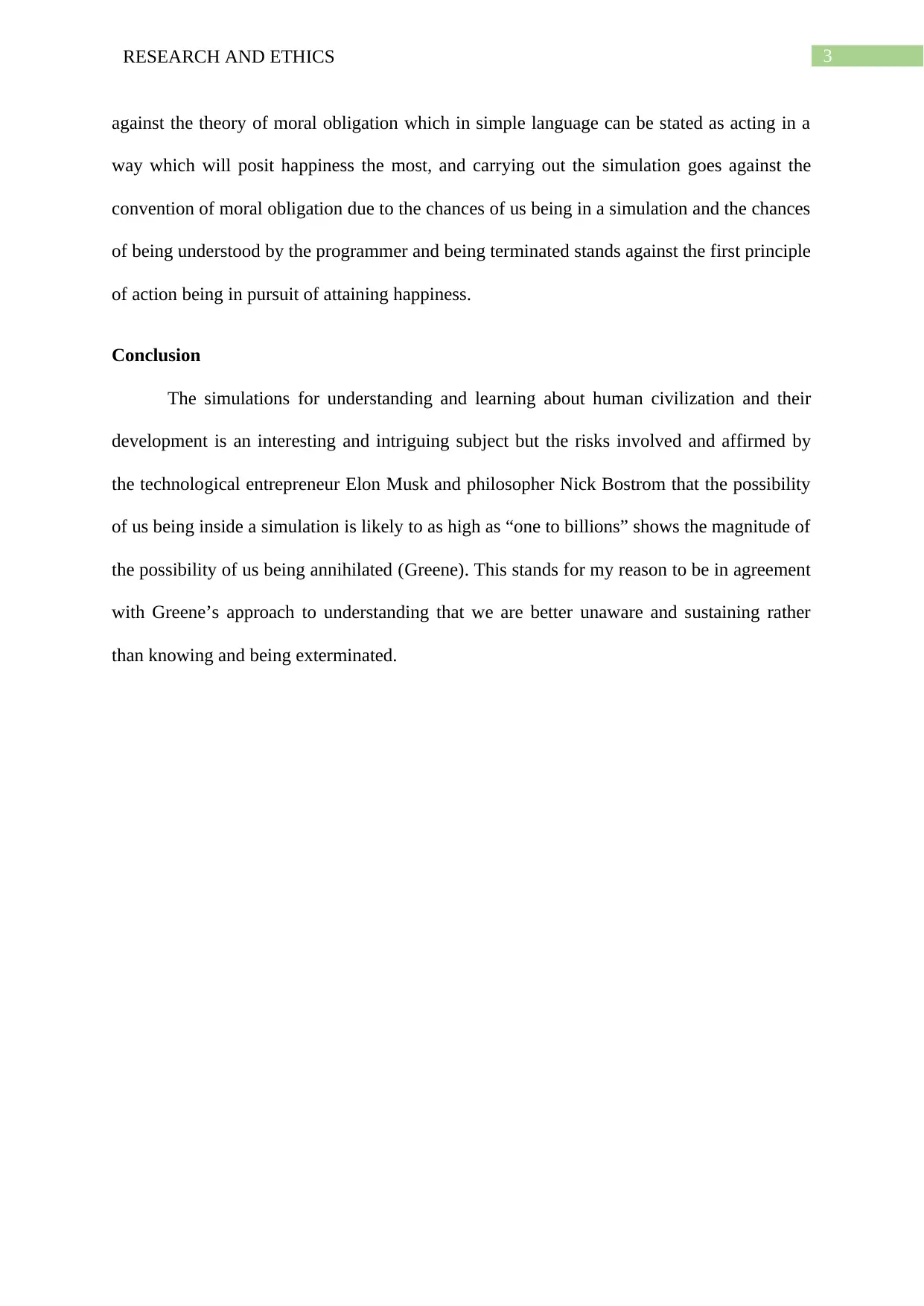
3RESEARCH AND ETHICS
against the theory of moral obligation which in simple language can be stated as acting in a
way which will posit happiness the most, and carrying out the simulation goes against the
convention of moral obligation due to the chances of us being in a simulation and the chances
of being understood by the programmer and being terminated stands against the first principle
of action being in pursuit of attaining happiness.
Conclusion
The simulations for understanding and learning about human civilization and their
development is an interesting and intriguing subject but the risks involved and affirmed by
the technological entrepreneur Elon Musk and philosopher Nick Bostrom that the possibility
of us being inside a simulation is likely to as high as “one to billions” shows the magnitude of
the possibility of us being annihilated (Greene). This stands for my reason to be in agreement
with Greene’s approach to understanding that we are better unaware and sustaining rather
than knowing and being exterminated.
against the theory of moral obligation which in simple language can be stated as acting in a
way which will posit happiness the most, and carrying out the simulation goes against the
convention of moral obligation due to the chances of us being in a simulation and the chances
of being understood by the programmer and being terminated stands against the first principle
of action being in pursuit of attaining happiness.
Conclusion
The simulations for understanding and learning about human civilization and their
development is an interesting and intriguing subject but the risks involved and affirmed by
the technological entrepreneur Elon Musk and philosopher Nick Bostrom that the possibility
of us being inside a simulation is likely to as high as “one to billions” shows the magnitude of
the possibility of us being annihilated (Greene). This stands for my reason to be in agreement
with Greene’s approach to understanding that we are better unaware and sustaining rather
than knowing and being exterminated.
Paraphrase This Document
Need a fresh take? Get an instant paraphrase of this document with our AI Paraphraser
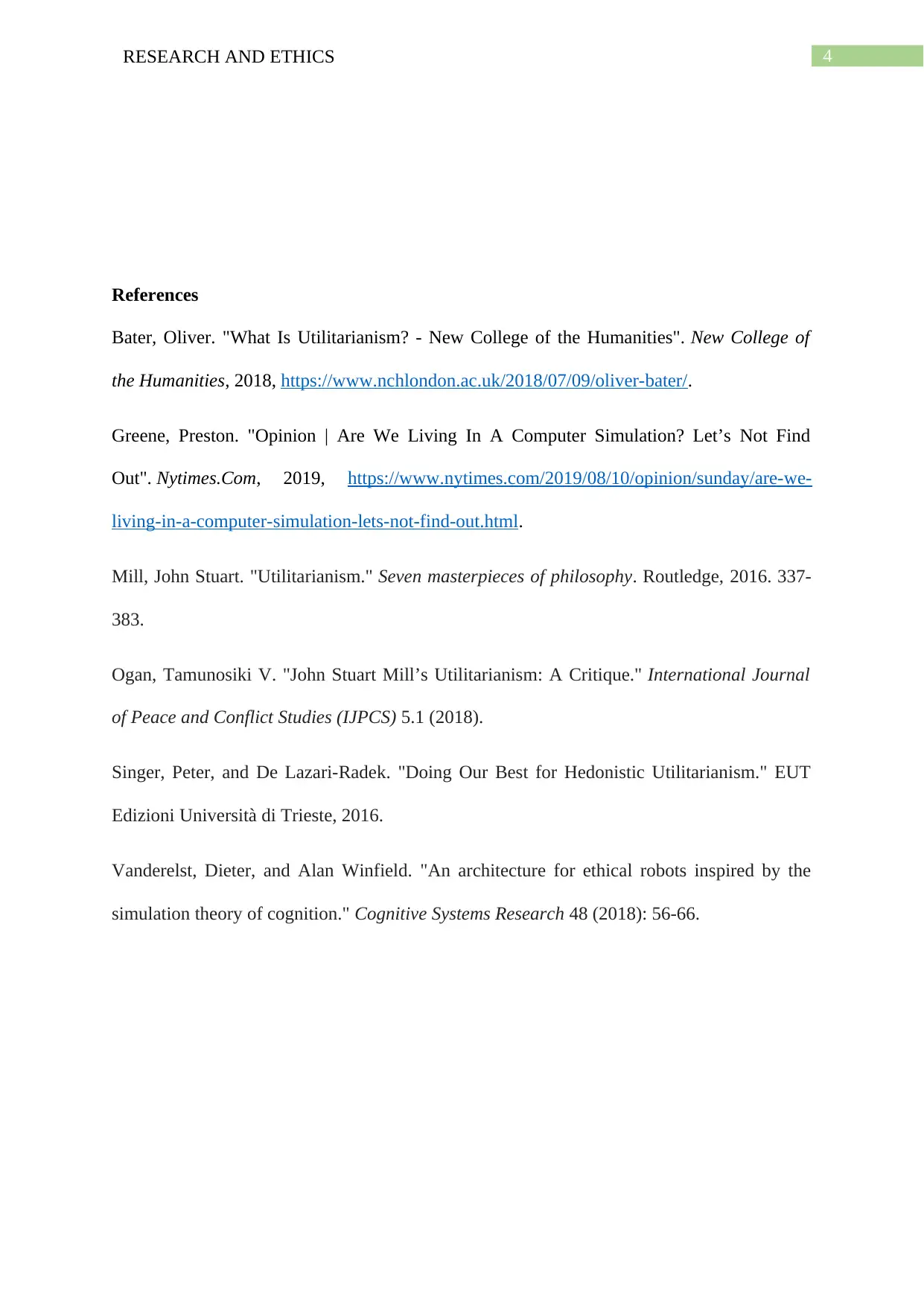
4RESEARCH AND ETHICS
References
Bater, Oliver. "What Is Utilitarianism? - New College of the Humanities". New College of
the Humanities, 2018, https://www.nchlondon.ac.uk/2018/07/09/oliver-bater/.
Greene, Preston. "Opinion | Are We Living In A Computer Simulation? Let’s Not Find
Out". Nytimes.Com, 2019, https://www.nytimes.com/2019/08/10/opinion/sunday/are-we-
living-in-a-computer-simulation-lets-not-find-out.html.
Mill, John Stuart. "Utilitarianism." Seven masterpieces of philosophy. Routledge, 2016. 337-
383.
Ogan, Tamunosiki V. "John Stuart Mill’s Utilitarianism: A Critique." International Journal
of Peace and Conflict Studies (IJPCS) 5.1 (2018).
Singer, Peter, and De Lazari-Radek. "Doing Our Best for Hedonistic Utilitarianism." EUT
Edizioni Università di Trieste, 2016.
Vanderelst, Dieter, and Alan Winfield. "An architecture for ethical robots inspired by the
simulation theory of cognition." Cognitive Systems Research 48 (2018): 56-66.
References
Bater, Oliver. "What Is Utilitarianism? - New College of the Humanities". New College of
the Humanities, 2018, https://www.nchlondon.ac.uk/2018/07/09/oliver-bater/.
Greene, Preston. "Opinion | Are We Living In A Computer Simulation? Let’s Not Find
Out". Nytimes.Com, 2019, https://www.nytimes.com/2019/08/10/opinion/sunday/are-we-
living-in-a-computer-simulation-lets-not-find-out.html.
Mill, John Stuart. "Utilitarianism." Seven masterpieces of philosophy. Routledge, 2016. 337-
383.
Ogan, Tamunosiki V. "John Stuart Mill’s Utilitarianism: A Critique." International Journal
of Peace and Conflict Studies (IJPCS) 5.1 (2018).
Singer, Peter, and De Lazari-Radek. "Doing Our Best for Hedonistic Utilitarianism." EUT
Edizioni Università di Trieste, 2016.
Vanderelst, Dieter, and Alan Winfield. "An architecture for ethical robots inspired by the
simulation theory of cognition." Cognitive Systems Research 48 (2018): 56-66.
1 out of 5
Related Documents
Your All-in-One AI-Powered Toolkit for Academic Success.
+13062052269
info@desklib.com
Available 24*7 on WhatsApp / Email
![[object Object]](/_next/static/media/star-bottom.7253800d.svg)
Unlock your academic potential
Copyright © 2020–2026 A2Z Services. All Rights Reserved. Developed and managed by ZUCOL.





